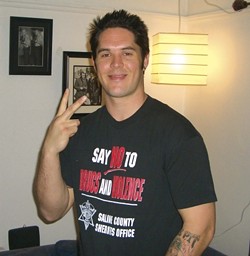Budding controversy
A federal-versus-state legal divide comes to a head at SLO County's sole medical marijuana dispensary
By Ryan Miller[{
"name": "Ad - Medium Rectangle CC01 - 300x250",
"id": "AdMediumRectangleCC01300x250",
"class": "inlineCenter",
"insertPoint": "8",
"component": "2963441",
"requiredCountToDisplay": "12"
},{
"name": "Ad - Medium Rectangle LC01 - 300x250",
"id": "AdMediumRectangleCC01300x250",
"class": "inlineCenter",
"insertPoint": "18",
"component": "2963441",
"requiredCountToDisplay": "22"
},{
"name": "Ad - Medium Rectangle LC09 - 300x250",
"id": "AdMediumRectangleLC09300x250",
"class": "inlineCenter",
"insertPoint": "28",
"component": "3252660",
"requiredCountToDisplay": "32"
}]
Almost exactly a year ago, Charles Lynch opened San Luis Obispo County's first medical marijuana dispensary. After testing the waters in Atascadero and finding them frigid, he set up shop on Monterey Street in Morro Bay. He got a business license, hired security, and began providing doctor-approved marijuana from behind the tinted windows of the two-story storefront.
His move sent ripples of doubt throughout the Central Coast
# Would crime rates skyrocket in the streets around his shop? Was the city about to be overrun by similar entrepreneurs? but as the months went by, not much happened. Business, as they say, was usual.Then, just before 11 a.m. on March 29 of this year, right around when Central Coast Compassionate Caregivers was opening its doors for another day, about a dozen members of the San Luis Obispo County Sheriff's Department and U.S. Drug Enforcement Administration served a federal search warrant and local arrest warrant on the business.
The action fanned the flames of confusion that have been burning in the gap between federal and state law, a gap that formed when California decided to decriminalize marijuana use in some situations despite the federal government's unchanging stance on the illegality of the drug in all circumstances.
At the shop
Sheriff's Sergeant and Public Information Officer Brian Hascall reported that Abram Baxter, a 26-year-old Los Osos resident and shop employee, was arrested on March 29 under the local warrant on suspicion of two violations of California Health and Safety Code involving possession of marijuana or hashish for sale and selling, furnishing, or transporting marijuana or hashish (see sidebar).
Federal agents and members of the local Narcotics Unit spent the afternoon in the shop after serving the warrant. Some took down the names and other information of customers arriving throughout the day. One man, Rudy Bernal of Santa Maria who's been a customer there "since they opened their doors" was particularly unhappy with the proceedings.
"I don't know what to say, man. This is ridiculous," he said after conversing with a detective in the doorway to the business. "To me, it's a form of harassment. It's a quiet harassment."
At about 2:30, detectives descended the stairs laden with boxes, bags, and computer hard drives, most labeled in thick, black marker. One large box read, "Room D/Bud From Display Case."
In all, the agents stacked 18 large bins on the sidewalk, each clear plastic container packed with marijuana. Some sported labels with a date and a name like "Diesel" or "Train Wreck." Then, everything was packed away into various vehicles waiting at the curb.
# Sgt. Hascall stood on the shady sidewalk and fielded questions from gathering media and random passersby. He frequently apologized for not being able to say more than the most basic of details. The warrant served on the business as well as one simultaneously served on Lynch's Arroyo Grande home was sealed on the request of the U.S. attorney. Hascall likened the sealing to a gag order. Since the warrants were under wraps and might not be opened for weeks, he noted his answers were limited.
Still, he did say that the day's proceedings were the culmination of about a year's worth of investigation that dated back to Lynch's fledgling operations in Atascadero.
"The entire investigation started with us," Hascall said in a later interview. "I can't say why, but we started the investigation, and then because of the nature of the investigation, we requested the DEA's assistance, and it became a joint investigation between the two of us. That's common for it to be done that way."
In the wake of the warrants served, attorney Lou Koory, who represents Charles Lynch and Central Coast Compassionate Caregivers, wanted to emphasize that there was no state search warrant.
"Instead, they (the Sheriff's Department) cooperated with the DEA and hid behind a federal warrant, despite the fact that the Sheriff's duty is to enforce state law," Koory said.
Hascall explained that the Sheriff's Department has a duty to uphold both state and federal laws, pointing to the oath of office that requires them to support and defend the Constitution of the United States of America as well as the Constitution of the State of California.
"That's where the conflict between the federal law and the state law becomes such a problem," Hascall said.
"State courts enforce state law," Koory countered. "Their (the Sheriff's Department's) duty is to enforce state law."
California voters passed Proposition 215 in 1996, allowing physicians to recommend marijuana to patients and providing for the plant's cultivation, transportation, and use. Known as the Compassionate Use Act, the law essentially exempts patients and caregivers from state criminal punishment for medical marijuana-related activity. In 2003, Senate Bill 420 was written into law to clarify the issue even more. The message to members of law-enforcement agencies was clear: For some people the really sick ones it's okay to smoke pot.
But that's just according to California.
Despite the Golden State's progressive legal move, the federal government remained unwavering in its stance. The U.S. Drug Enforcement Administration's web site explains that marijuana is listed as a Schedule I drug under the Controlled Substance Act, meaning it's "classified as having a high potential for abuse, no currently accepted medical use in treatment in the United States, and a lack of accepted safety for use of the drug or other substance under medical supervision."
A section titled "The DEA Position On Marijuana" refutes claims that the DEA targets sick and dying people using the drug, mentioning, instead, that agents target criminals engaged in cultivation and trafficking.
"No state has legalized the trafficking of marijuana," the text states, "including the twelve states that have decriminalized certain marijuana use."
Sgt. Hascall acknowledged the problematic rift and said he'd like to see it resolved one way or another.
"It would make it a lot easier for us to enforce the law if we had a consistent law to enforce," he said.
The bigger picture
Even in the early days of operating Central Coast Compassionate Caregivers, as reported by New Times last year, Lynch could feel federal intervention looming. In theory, all dispensary owners operate under the dark clouds of potential federal legal action, but when, how, and if enforcement will strike in the form of warrants and raids seems to be as unpredictable as lightning.
"It's always a risk," Koory said, adding that Lynch is still operating
# under a sense of responsibility to patients and members of the cooperative despite the obvious risk of federal prosecution. "He sticks his neck out every day out there, and the risk was realized last week."Koory pointed out that the business license is still valid and the facility was complying with regulations. Lynch wasn't arrested, and business is going on as normally as possible given the circumstances.
The attorney explained that he knows of dispensary operators who were raided but never faced federal charges, as well as some who've gone to federal prison. Charges that do materialize, he said, typically result from large cultivation operations, guns, large amounts of cash, and the like. Central Coast Compassionate Caregivers, he said, is a highly regulated dispensary that's "never had one problem." Though he admitted that federal officers don't need a whole lot of reasons to serve a warrant on a dispensary, the recent raid doesn't seem to him to be in line with previous actions throughout the state.
As for why the warrants were served in the Morro Bay case, Hascall again referred to their sealed nature.
"When these search warrants are unsealed, you'll understand with much more clarity why this incident occurred and why it occurred the way it did," he said.
In the meantime, the obscured-for-now motivation behind this particular action has underscored general feelings of confusion in the medical marijuana community. The divide between the state and federal laws seems to swallow up certain businesses and entrepreneurs, but allows others to remain standing.
Ken Estes, a Bay Area resident who's opened cannabis clubs around the state, has seen just about every permutation of enforcement in his years in the business. He's faced moratoriums, cease-and-desist orders, and arrests. He's come up against agents from city, state, and federal enforcement agencies. In all, he said, he's opened 10 different cannabis clubs, four of which are still currently operating: Richmond, San Francisco, Clear Lake, and Lake Tahoe.
His operations first moved from Oakland to Concord to Berkeley where he shut down after he said he was robbed several times in one year. He then went back to Oakland.
"We took Oakland by storm with this new medicine called Granddaddy Purple," he said. "We were going through 800 people a day."
That enterprise closed down due to what Estes dubs "political maneuvering," sending him to Hayward, Concord again, and Richmond. Now, he's looking at setting up shop in San Mateo, and has been eyeing San Luis Obispo as a potential next step.
"I do believe in your area, there's a lot of herbal-minded people," he said. "And I think those communities should allow patients access to medicine near them."
He's also got experience in Southern California, where he was one of a baker's dozen of dispensaries raided in San Diego last summer.
"Every year, I kept relocating," he said. "Everybody tells me I should write the book on this."
He certainly has the experience. Estes easily rattles off what various cities charge for a medicinal marijuana sales permit and recalls his own journey into what he sees as less of a business and more of a mission of advocacy. After a motorcycle accident sent him to a wheelchair when he was 18, he discovered "through trial and error" that marijuana worked better than pills at managing pain in his back.
"That's why I've been an advocate," he said. "Because it works."
He said that he prefers the pills because they lack the side effects of smoke, smell, and more, but attributes his current health to a good diet and medical marijuana. He delivers his message wherever he goes, and meets with mayors, city managers, chiefs of police, and other officials as he looks for ways to bring cannabis dispensaries into more cities. The legal setbacks along the way are part and parcel with the territory.
Despite his message of tolerance and acceptance, Estes doesn't argue for free passes for anyone who wants to hang a shingle in the state.
"If a cannabis owner is doing something illegal other than the medical marijuana I think they should be under scrutiny," he said.
Therein lies the rub. The "other than the medical marijuana" part doesn't fly with the feds.
Sarah Pullen, public information officer for the DEA's Los Angeles field division which covers San Luis Obispo said the agency doesn't specifically track cases involving medical marijuana dispensaries.
That's because to the agency, they're all illegal.
"It's just like any drug dealer, no different," she said. "If someone's selling crack on the street, sure we'd like to get them. We'd like to get them all, but we're more interested in moving up the food chain.
"Marijuana is illegal under federal law under any shape or form," she said. "We don't need a violation of state law to take action."
In light of such an enforcement philosophy and given his long and varied history with law enforcement Estes is as confused as anyone when it comes to figuring out why some dispensaries are raided while others continue to operate unchallenged. He pointed out that web sites not only list dispensaries around the state, but sometimes provide ratings for various types of marijuana.
"Why don't they raid everybody?" he said. "Somehow, somebody does something to get onto the radar. Maybe he's got a history. Maybe somebody calls and complains.
I believe it's political."
Kris Hermes, legal campaign director for Americans for Safe Access in Oakland, agreed with that assessment.
"You can look up these places in the phone book," he said. "You couldn't have an easier target if you're a federal agent. They just basically close their eyes and pick whoever they want to."
He called DEA enforcement "extremely selective," citing that more than 100 dispensaries operate in basically the same way in the Los Angeles area, but not all of them will hear the long arm of the law knocking on their doors.
Ultimately, he believes that the current, seemingly patchwork process is harassment intended to breed fear and intimidation. He also alleged that that local law-enforcement bodies, frustrated by the presence of cannabis clubs in their communities, can find a willing helper in the DEA not typically the other way around.
"The federal government does not need help from local officials and local law enforcement," he said.
The DEA's Pullen said that the agency does typically use local law enforcement in all enforcement actions. Like Hascall, though, she couldn't get into specifics of the Morro Bay case, but said the process is similar to any other case: For whatever reason, some dispensaries draw more attention, draw more complaints, or become associated with related crimes.
The future
The day after the warrant was served in Morro Bay, a woman answered the phone at Central Coast Compassionate Caregivers. The office was closed, she explained, while they were "picking up the pieces" in the aftermath of the visit from the detectives and DEA agents.
"We're not going to let the feds stop us," she said, expressing a belief that the business would be up and going again soon.
No one answered the phone not even an answering machine at the beginning of the week of April 2, though Koory said that members of the cooperative were working hard and expected it to re-open within days.
Sgt. Hascall expects the investigation to conclude within a couple of weeks.
Sidebar: One man's take
On the morning of March 29, Abram Baxter, a 26-year-old Los Osos resident, was arrested outside of Central Coast Compassionate Caregivers in Morro Bay. Baxter, a new father and aspiring acoustic rock musician, feels he was dealt an injustice. He sat down with New Times for an exclusive interview:
# NEW TIMES: Walk through what happened the day of the raid.
BAXTER: I got to work around 10:45 (a.m.). It was a nice, beautiful day. I crossed the street and the sheriffs jumped out of the car and rolled up on me from my left shoulder. I wasn't even in the building yet. They arrested me. They didn't even read me my rights they just handcuffed me and put me in the back of the car. Then they asked me all kinds of questions, trying to get me to talk. I said, "I plead the fifth."
NEW TIMES: What did they say to you when they arrested you?
BAXTER: They told me [I was] being arrested for selling a half-pound that was sold outside the club.
NEW TIMES: Did you have any marijuana on you at the time of the arrest?
BAXTER: No, no, no! It's not even like that.
NEW TIMES: What jail were you in, and for how long?
BAXTER: I was in SLO County Jail for about four to five hours. My girlfriend got some people together and bailed me out. Bail was set at 20 grand. This hit me at the wrong time. I have a daughter, I'm out of a job, my car payment is due. Everything is all due at once, and I don't even know if I'm going to get my paycheck from there because it's so crazy.
NEW TIMES: Do you feel that the law enforcement targeted you personally?
BAXTER: In a way, I feel that they used me as a scapegoat, but they had to arrest someone. They can't go do some big thing and not arrest anyone then there's going to be a lot of questions asked.
NEW TIMES: When you first started working at the dispensary, were you aware of the risks?
BAXTER: I was aware that there were risks, but I just had a daughter and I just needed a job. I knew there were risks, but I didn't know they were as big. Once the place got raided, I was like, "Wow, this is serious."
NEW TIMES: How much money were you making and what was your position?
BAXTER: I was making $15 an hour just basically doing security, and then I got promoted to chief of security.
NEW TIMES: What type of security procedures did you do at the club?
BAXTER: It's one of the best clubs in California, and we do everything very professional. So many times I went outside and made sure people weren't passing stuff and taking stuff out of their bags. I made sure people weren't drinking in their cars and weren't loitering or parking out front. As tight as you could be as a club, we were. We pick through everything and make sure there's nothing wrong with any of it. We let patients know what they're smoking, whether it's sativa or indica or whatever. Without places like this, people go get some stuff off the street that might be laced. The county of SLO has an ordinance that states everything: what your hours can be, how old the people are that work there all sorts of rules, and we followed them to a T. The club did nothing wrong. It was bogus what they (the Sheriff's Department) did, in my eyes. I don't think this is the land of the free, I think it's the land of the fee.
NEW TIMES: What do you see happening to your patients now?
BAXTER: They might have to hit the streets, the black market. A patient was telling me he got beat up by some guys when he was trying to get some marijuana on the streets. When you go into a place where there are drugs or illegal stuff going on, bad things are going to happen. So we were like a safe haven for people to come and get what they need. I feel bad for the patients they're good people. I saw everything in that place, and we didn't do one thing wrong in the club. They made that place look bad, and I think it's horrible what they did.
NEW TIMES: How many customers were visiting the dispensary a day?
BAXTER: We don't call them customers, we call them patients, and I'd say probably around 70 to 120.
NEW TIMES: Describe the patients' occupations and ages.
BAXTER: They were anywhere from 18 to 75 years old. I've seen people from grocery stores, people in the legal system I mean everyone.
NEW TIMES: On the average, how much marijuana was sold in the dispensary in a day?
BAXTER: We don't sell, we provide, and I don't know that. But we don't provide any more than an ounce per patient because we don't want people to come in and buy it, then go sell it on the street.
NEW TIMES: What do you think the biggest misconception about this case is?
BAXTER: That I sell to a bunch of patients without recs (doctor's recommendations). I'm not a drug dealer. That's all there is to it. They (law enforcement) tried to entrap me. I was supposed to be a poster boy. They had to have an arrest, so why not arrest the security guard over here? And that's what they did. They would have taken that place down no matter what.
NEW TIMES: Is there anything you would like to add?
BAXTER: I've been falsely accused. I think this whole thing is wrong.
Kai Beech
Ed. note: Sheriff's Sgt. Brian Hascall said he hadn't seen Baxter's arrest report, and so couldn't comment on the reading of rights issue, though he said that questions about the warrant simultaneously being served on the business would fall outside of the realm of typical Miranda rights. The sealed nature of the warrants prevented him from commenting on what led to the alleged-marijuana-sales-related arrest, but he did say that the local warrant was issued for charges "consistent with that type of activity."
Contributor Kylie Mendonca and Managing Editor Patrick Howe contributed to this story. Editor Ryan Miller can be reached at [email protected].
Latest in News
Readers also liked…
-

Coast Unified teachers upset over new position's salary and qualifications
Oct 20, 2022 -

SLO police identify alleged driver who hit and killed couple
Dec 22, 2022 -

When the levee breaks: Oceano residents, county officials walk a tightrope of regulations to manage Arroyo Grande Creek, which some say led to the levee's failure in January
May 18, 2023












